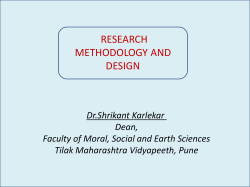
5. What is reality? - University of Waterloo
4/9/15 Outline 1. Questions about reality 2. Theories about reality 3. Materialism 4. Truth 5. Causality and explanation What is Reality? Paul Thagard University of Waterloo 1 Reality Questions The Story so Far 1. What is real? 1. Mind=brain, i.e. all mental processes are neural mechanisms, which are physical (biochemical) processes. Lectures 2-3. 2. What is truth? 3. Does science approach truth? 2. Knowledge is multimodal, consisting of semantic pointers that are reliably acquired good approximations to the external world. Lecture 4. 4. What is causality? 5. God? Minds? Etc. Method: consider alternative answers and choose according to coherence with all knowledge, especially science. 2 3. Knowledge develops by additions and 3 revisions based on explanatory coherence. Lecture 4. 4 1 4/9/15 How to decide what exists? What is Real? Force. Authority. Faith. Wishful thinking. Reliable coherentism: 1. Collect evidence using fairly reliable procedures such as perception, memory, testimony. 2. Use arguments to assemble hypotheses and evidence. 3. Use coherence to pick the hypotheses most coherent with the evidence. Skepticism: nothing is real (Buddhism, postmodernism) Idealism: only mind is real. Objective: the real is one big mind. Subjective: the real is just your mind. Dualism: reality = mind + matter Materialism: reality = matter/energy 6 5 Truth Materialism Hence materialism is true, and provides the best available explanation of all evidence, from science and everyday life. Inference to the best explanation by explanatory coherence supports the existence of a world independent of our minds. 1. Psychology: we can’t control most perceptions. 2. Cosmology: history of the universe 3. Biology: theory of evolution So there is no life after death – immortality and soul do not exist. So truth is approximate correspondence of neural representations to reality. If mind=brain, then idealism, dualism, and panpsychism (everything has consciousness) are false. 7 8 2 4/9/15 Theories of science Truth - alternatives Truth is coherence (Hegel, idealism). Relativism: science is just another form of discourse and social relations. Fails because of external world and external constraints on evidence. Empiricism: science just tries to be adequate at describing phenomena. Coherence theory of knowledge makes a coherence theory of truth implausible. Scientific realism: science tries and sometimes succeeds in finding truths about the world, using inference to the best explanation. Truth is redundant: to say that a sentence is true is just to say the sentence. No: sentences are used to make claims about correspondence to the world. 9 Scientific Realism 10 Explanation 1. That science aims for truth is clear from the efforts of scientists to perform robust experiments, develop explanatory theories, and comparatively evaluate them. 2. That science sometimes succeeds in 1. Explanation is telling a story that answers a question. Narrative, e.g. why did Slovakia become independent? 2. Explanation is explaining away, elimination. E.g. soul. approximating truth is the best explanation: a) Technological success b) The cumulative nature of science c) The interpersonal agreement of science 11 3. Explanation is deduction from scientific laws. Deductive-nomological. 4. Explanation is showing how something results from a causal mechanism. 12 3 4/9/15 Mechanism What is Causality? Mechanism = system of interconnected parts whose interactions produce regular changes. 1. Causality is an illusion (positivism) 2. Causal power – mysterious 3. Constant conjunction – Hume Results may be emergent, i.e. belonging to wholes but not parts because they result from interactions of parts. 4. Probability (effect given cause) > probability (effect) Note that “produce” means more than just what happens next: cause! 5. Causality is a mind-detectable temporal pattern in the world resulting from mechanisms. 13 3-analysis of Causality 14 How to decide if X exists? 1. Exemplars: pushes, pulls, motions 1. Construct hypotheses about X. 2. Collect evidence relevant to X using reliable 2. Typical features: a) Sensory-motor-sensory patterns – infants b) Regularities: children c) Manipulations: children d) Statistical dependencies + causal networks: scientists 3. Explains: why things happen, why procedures such as perception, memory, testimony, instruments, experiments. 3. Use arguments to assemble hypotheses and evidence. Consider alternative hypotheses. 4. Accept the hypotheses most coherent with the evidence. 5. Believe in X if hypotheses about X are accepted; otherwise, don’t believe in X. interventions work 15 16 4 4/9/15 Does God Exist? Do Other Minds Exist? 1. Is God the best explanation of the existence of the universe, biological design, moral instincts, popularity of religion? 2. No: all of these can be better explained by physics, evolutionary biology, cognitive neuroscience, and social science. 3. Therefore, God is not part of the most explanatorily coherent account of the world. 17 Do Social Groups Exist Are countries, nations, universities, departments, clubs, families, etc. just the sum of their parts? No: they have emergent properties, e.g. going to war, declaring independence, granting degrees, admitting members, being happy. So groups exist, because they help to explain the behavior and mental representations of individuals. But there are no collective ideas, thoughts, emotions. 19 Yes: the existence of other minds is the best explanation of why other people behave like me, as explained by similar brain structures and evolution. Alternatives? Do non-human animals have minds? Yes, e.g. mammals experiencing pain. But nonhumans are limited in their ability to do recursive bindings so they can’t do full language or social emotions. Do computers have minds? Not yet. 18 Emergence Emergent properties are possessed by the whole, not by the parts, and are not simple aggregates of the properties of the parts because they result from interactions of parts. 20 5 4/9/15 Multilevel Emergence Other Questions Social events (e.g. riots) and changes (e.g. government) result from multilevel emergence: social, psychological, neural, and molecular mechanisms. What is mathematical reality? Reject: Platonism, empiricism, but what is alternative? Number concepts are innate. What are space, time, and space-time? Reject: social relativism, empiricism, but what is alternative? Can relativity theory and quantum theory be reconciled? 21 22 Conclusions 1. Materialism is true. 2. Truth is correspondence to the external world. 3. Causality is a kind of pattern in the world. 4. Supernatural entities do not exist. 23 6
© Copyright 2025


















